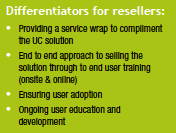
Unified Communications is exploding in popularity right now and as workers embrace the mobility trend mobile is quite often at the core of the UC conversations. The UK government has just announced the right for workers to request flexible working hours, and this will have a direct impact upon the increased role of mobile technology within the workspace. Here we take a look at the UC trend and how the Channel can get take advantage
Is it time for a revolution? Until now mobility and UC haven’t necessarily been synonymous with each other and it is leading us down a road where mobile is becoming the centre of the UC conversation.
 Rob Pickering, CEO at British UC vendor ipcortex says, “The fact that we consider mobility to be a separate topic of conversation to UC in general tells a story in itself. Historically, it’s a market where vendors have developed distinct tools to satisfy the niche and, uniquely, considered UC with external parties to be a separate, secondary requirement. While that might have been a lucrative position in a less connected world, we’re now on the cusp of a cross platform revolution where it doesn’t matter where you are, or what device you’re using, there will be an expectation of a consistent user experience. In a few years time you won’t need to carry mobility products in your portfolio - your standard UC offering will be able to include all of that as standard.”
Rob Pickering, CEO at British UC vendor ipcortex says, “The fact that we consider mobility to be a separate topic of conversation to UC in general tells a story in itself. Historically, it’s a market where vendors have developed distinct tools to satisfy the niche and, uniquely, considered UC with external parties to be a separate, secondary requirement. While that might have been a lucrative position in a less connected world, we’re now on the cusp of a cross platform revolution where it doesn’t matter where you are, or what device you’re using, there will be an expectation of a consistent user experience. In a few years time you won’t need to carry mobility products in your portfolio - your standard UC offering will be able to include all of that as standard.”
What’s changing that makes this all possible? Pickering continued, “The ubiquity of tablets, mobile phones and other smart devices is the driving factor, but cross platform compatibility is still a technical challenge and remains the largest barrier to truly mobile UC. What will erode that barrier is the adoption of technologies like HTML5 and WebRTC, which make it easy to deliver real time audio, video and chat via web browsers with no installation required. That means there’s no reason that desk phones, desktop computers, laptops, tablets, mobile phones and maybe in the not too distant future wearable technology (Google Glass, or Smart Watches anyone?) can’t all provide a common and joined-up user experience.”
According to John Bird, Head of Systems and Support Services at Exertis Micro-P, growth within the UC solutions channel has primarily been the result of two key factors – mobility and application (CTI) integration, with an emerging trend for mobility based solutions to be integrated to traditional PBX voice infrastructure.
Bird explains “It’s clear that the evolution of UC technology and the change in working practices have fuelled huge growth within the UC channel. No longer is a workforce tied into an office based environment and both staff and employers benefit from the increased efficiencies and productivities, along with cost reductions, that mobile working and flexible working hours provide.
Charles Aylwin, Director, Channel and Public Sector, for 8x8 Solutions added, “It depends on your definition of mobility – if that means being able to do work while you are moving via a smartphone or tablet then this is part of it but not the whole picture, for business users at least. It’s more likely that the integration of voice, chat, video, document sharing and collaboration and the ability to easily access these remotely (i.e. away from the normal office location either at home or at another office) is the dominant user case at the moment. The mobility angle is often limited by the functionality and performance of mobile clients, but some like 8x8’s Virtual Office provide full integrated UC functionality on smartphone and tablet clients enabling true mobility so this is just going to become more and more important.”
End User Pressure
End users are more aware of technology than ever before but are they initiating the UC conversation with Channel partners?
 Paul Pyatt of ICON commented, “There is still a huge educational exercise needed both in the market, and in the channel, before UC is sufficiently understood to be requested by the user.
Paul Pyatt of ICON commented, “There is still a huge educational exercise needed both in the market, and in the channel, before UC is sufficiently understood to be requested by the user.
Many users are still ignorant of what UC means and how it relates to a modern day telephone system. The message that UC is affordable and can have a marked impact on bottom line has been slow to permeate through the channel to the end user. In some cases, resellers do not fully understand UC and are not confident about talking about UC to the customer. In other cases, resellers prefer to stick to the traditional sales model of proposing extensions and lines rather than business solutions.
For the reseller who is willing to embrace UC fully the opportunities are numerous” but says Paul “The reseller must adopt a different selling model to the traditional extensions and lines approach. It’s all about solutions when you are selling UC”
UC is about business processes and productivity. A UC solution links in with the work processes of your company and enhances the way you work.
The reseller who is prepared to spend just that little more time to understand the customers’ business and how they work is able to offer a solution customised for the company. Setting themselves apart from the traditional resellers in this way is a brave step for many to take.”
Early Days
Julien Parven, Marketing Director of Daisy Distribution, thinks the market still has a long way to go.
“The UC explosion has not yet happened as many thought it would and as such, it is more of a difficult sell. Partners are ultimately trying to persuade customers who may be looking for separate fixed and mobile solutions to combine the two, which initially is seen to be increasing their expenditure. So when the customer’s main objective was to review their fixed or mobile estates in order to reduce their costs, you can see why it is such a hard sell. However, a total cost of ownership demonstration, combined with the business productivity and efficiency benefits that a UC solution can bring, can help a proficient reseller to overcome those objections.”
 Ipanema’s VP of marketing, Béatrice Piquer- Durand added, “The proliferation of UC in the workplace creates a compelling opportunity for the channel. As businesses deploy and utilise UC, there will be knock-on effects for the rest of the IT structure within the business. Resellers have the opportunity to take on a consultative role, by offering insight into the impact of UC, and suggesting the best way for it to be deployed in the most efficient manner.
Ipanema’s VP of marketing, Béatrice Piquer- Durand added, “The proliferation of UC in the workplace creates a compelling opportunity for the channel. As businesses deploy and utilise UC, there will be knock-on effects for the rest of the IT structure within the business. Resellers have the opportunity to take on a consultative role, by offering insight into the impact of UC, and suggesting the best way for it to be deployed in the most efficient manner.
It’s now far more lucrative to offer your customers a service which guarantees their network will function with the UC apps they’ve installed. By supplying software that allows your customers absolute visibility of what’s running over their network, and how the applications are performing, you take a crucial, lasting role in your customers’ network infrastructure.”
Although the opportunity of UC is huge challenges still remain. John Howard, Executive Director, EMEA, Unified Communications & Collaboration at Logitech for Business says “According to Wainhouse Research (2013) almost 75% of the channel partners surveyed believe that customers’ interests are strongest in the areas of mobile video conferencing and integrating video conferencing with unified communications.
More than half the respondents believe customer confusion is a major challenge – this is where channel partners can play a crucial role in demystifying and advising on the best options including the right mix of solutions tailored to the demographics of the workforce. For instance, desktop collaboration solutions for those in open space or remote workers, to group collaboration solutions for small and large teams in the office, through to mobile collaboration tools for those that are on the go or are nomadic such as sales staff. The ideal organisation has an all-encompassing approach to UC solutions across the entire workplace, from mobile, to desk, to meeting room, globally to achieve a consistent experience regardless of geography, room or on-the-go.”
The Skype Effect
Most of us will have used various ‘free’ consumer products out there in our personal lives, notably services like Skype and Dropbox but how do services like these impact resellers trying to sell UC business solutions.
 Deborah Smith, Lync Product Manager for Cobweb Solutions says “There are many consumer UC apps on the market today, most notably Skype. They are very good products and very easy to use, however, in a business environment they come up short. They do not offer a viable alternative to an existing telephone/ contact centre system and they certainly would not replace an existing conferencing system. Companies that are serious about using UC in a professional way use business-grade UC applications.
Deborah Smith, Lync Product Manager for Cobweb Solutions says “There are many consumer UC apps on the market today, most notably Skype. They are very good products and very easy to use, however, in a business environment they come up short. They do not offer a viable alternative to an existing telephone/ contact centre system and they certainly would not replace an existing conferencing system. Companies that are serious about using UC in a professional way use business-grade UC applications.
Additionally, consumer UC solutions do not have the Exchange integration or security features and benefitsthat business-grade UC solutions such as Lync provide. Consumer UC apps are standalone solutions. Business-grade UC apps fully integrate with office application like Office and Dynamics and SharePoint to give you what Microsoft term as ‘Universal Communications’.
Aylwin added “The consumer market is different to the business market – quality can be lower and feature sets are much more limited. Businesses want more reliability, functionality and the opportunity to integrate with other business tools – it’s a solutions sell which has high value to the business customer.”
Dave Breith, CEO of Coms says “With the vast options of end user apps aimed at the consumer market, the UC sales cycle can be elongated depending on who you are dealing with within an organisation. If you’re negotiating with the CTO or similar then the sales process is easier than scenarios with other non-technical buyers that require educating, therefore possibly making the sales cycle longer than expected.”
Not all about the Benjamin’s
Although cost can often be a key driver for businesses looking at new technology UC can provide many other benefits in terms of productivity and efficiency. Richard Johnson, head of UK channel sales at Meetingzone talks about single vendor solutions versus best of breed, “The ability to communicate at any time isn’t the only plus point of UC. It can help reduce overall IT costs, drive productivity and improve collaboration for your organisation. It can also give management a valuable tool to see where their staff are at any given time via Presence, so they know they can always reach their team when necessary.
Customer requirements vary, so different vendor solutions will be attractive in different scenarios. A single application on a mobile device is ideal for collaboration. UC is never more ‘unified’ than in the ‘click’ of a single app on a mobile device. However, for any single vendor to provide a high quality product or service they need to specialise. Unified Communications is the drawing together of multiple global networks. So the key for any reseller is to partner with an organisation who have done the work to create the illusion of a single vendor solution with solid APIs and interfaces.
By bringing all of the above elements of UC together and the benefits, so they work effectively in any customers’ environment and on the right device, should, in effect, make the selling in of UC easier for the channel. “
 Andy Litherland, VP European Channels at Avaya added “At Avaya we believe that single vendor strategies are contrary to what unified communication is about – i.e. ultimate flexibility, accessibility and responsiveness. In these days of consumerised IT and a highly mobile workforce, businesses are unlikely to have their entire workforce to agree on particular application or device from one particular vendor: employees and the business both need, and deserve, choice – best of breed gives them the best of both worlds.
Andy Litherland, VP European Channels at Avaya added “At Avaya we believe that single vendor strategies are contrary to what unified communication is about – i.e. ultimate flexibility, accessibility and responsiveness. In these days of consumerised IT and a highly mobile workforce, businesses are unlikely to have their entire workforce to agree on particular application or device from one particular vendor: employees and the business both need, and deserve, choice – best of breed gives them the best of both worlds.
In UC, more than most IT sectors, it is important to design a solution that fits each business, rather than shoe-horning the organisation into a single, pre-determined solution. To accomplish this, a consultative approach is often needed across the service delivery chain and this is a key way for resellers to make themselves really stand out.
Also there is a growing demand from small and medium businesses for more complex communication capabilities, tailored to their market segment. Resellers need to be attuned to UC requirements of these mid-market organisations and may find that their relationships with vendors could prove decisive in winning business in this segment.”
Breith disagrees with Litherland, “I believe end users are better served working with a single vendor solution that can provide everything surrounding Traditional Telecoms / SIP / IT / Mobile. This is definitely the direction smaller aggregators and Resellers should take as they will benefit from greater support before, during and after the UC deployment.”
Paul Burn, Head of Category Sales, Nimans says “I think end users are best served by single reseller relationships who bring multiple solutions to the table, based on a consultancy approach. Choice is important but I wouldn’t advise an end user seeking six different solutions from six different partners and then trying to make them all work together. That’s when it becomes carnage and that’s where we’ve seen the biggest problems.”
Aylwin comments “Channel businesses have a fantastic opportunity to capitalise on the cloud based UC market – penetration is still at low levels so there are plenty of prospects and existing customer bases are ready for the technology, especially if they have ageing on premise PBX’s.
There are a lot of me too UC applications but most, on closer inspection, don’t have the level of functionality, integration and above all security. UC sales cycles can be extended, particularly where the buyers are having to go through an education as well as a purchasing process – in scenarios like this, channel partners who pick well supported platforms with a comprehensive list of market leading integrations, such as Salesforce & Netsuite amongst others, have a real advantage in what they can offer their customers.”
Paul Burn added “For me resellers don’t differentiate through product but through skill sets, approach, attitude and specific sector knowledge. The best resellers out there could sell any platform because they don’t win business on that basis; they capture sales because they have the right sales teams with the right mental attitude and are helping their customers grow and prosper. Of course they have to mould that to the applications and system they are selling but it’s not the product that dominates but the resellers themselves.”

